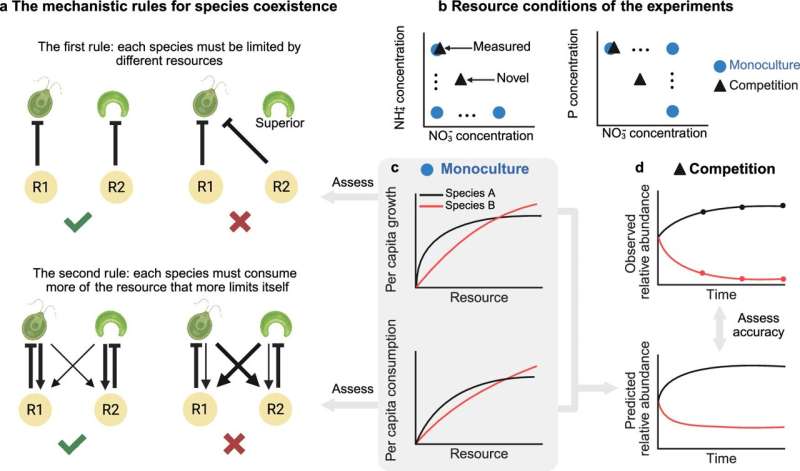Science
Researchers Develop Model to Predict Ecosystem Changes with Precision

Biological communities are in a constant state of flux, influenced by environmental conditions that can lead to the complete disappearance of individual species. To better understand and predict these transformations, researchers from the University of Konstanz have advanced a mechanistic model that can accurately forecast the development of biological communities across various ecosystems. Their findings, published in the journal Nature Communications, highlight the model’s potential application in a range of contexts, from natural habitats to biotechnological processes.
The study addresses a pressing question: Can mechanistic models truly predict ecological changes? The research team, led by Lutz Becks, a professor of limnology at the university, focused on communities of freshwater algae to test and expand upon a consumer-resource model. This model is grounded in the biological mechanisms that govern the coexistence of different species, offering a framework for understanding community dynamics.
Innovative Techniques Enable Comprehensive Testing
The foundational theories guiding this research date back to the 1960s. Becks noted, “Some previous attempts did prove successful in certain aspects,” referencing the work of his predecessor, Karl-Otto Rothhaupt. Significant advancements in laboratory technology have made it possible to conduct extensive experiments that were previously unfeasible. The team executed a staggering 864 growth experiments to determine the nutrient requirements and consumption patterns of various species of freshwater algae.
Modern high-throughput microscopes and lab robots streamlined the process, allowing for precise preparation and counting of monocultures without the need for extensive manual labor. This efficiency enabled the team to gather and analyze data more effectively than ever before.
Model Predicts Community Composition Accurately
Building on the data from their initial experiments, the researchers enhanced the existing mechanistic model by integrating resource usage as an additional parameter. Following this, they conducted 960 further experiments that combined different species under varying nutrient conditions. The results were striking: the model demonstrated a high degree of accuracy in predicting community compositions.
The team also utilized computer simulations to evaluate two ecological rules proposed by biologist David Tilman. These rules address how competing species coexist or displace one another based on their resource consumption. Their simulations confirmed that while one rule holds universally, the other applies only under specific conditions related to resource types.
The implications of this research extend beyond theoretical understanding. The model can be applied to various ecological scenarios, including the management of oceanic plankton communities and the optimization of microbiomes in human health.
Looking ahead, Becks and his colleague Daniel Dietrich plan to apply their findings in a project focused on enhancing CO2 sequestration through phytoplankton. This initiative, supported by the Vector Stiftung, aims to identify resilient phytoplankton communities capable of efficiently metabolizing CO2, even under fluctuating environmental conditions. Becks emphasizes the importance of these findings for climate protection efforts, stating, “Such communities could then be used to reliably sequester CO2 from the atmosphere.”
As the need for sustainable ecological practices becomes increasingly urgent, the development of predictive models like the one from the University of Konstanz represents a significant step forward in understanding and managing biological communities.
-

 Technology5 months ago
Technology5 months agoDiscover the Top 10 Calorie Counting Apps of 2025
-

 Health3 months ago
Health3 months agoBella Hadid Shares Health Update After Treatment for Lyme Disease
-

 Health3 months ago
Health3 months agoErin Bates Shares Recovery Update Following Sepsis Complications
-

 Technology4 months ago
Technology4 months agoDiscover How to Reverse Image Search Using ChatGPT Effortlessly
-

 Technology1 month ago
Technology1 month agoDiscover 2025’s Top GPUs for Exceptional 4K Gaming Performance
-

 Technology3 months ago
Technology3 months agoElectric Moto Influencer Surronster Arrested in Tijuana
-

 Technology5 months ago
Technology5 months agoMeta Initiates $60B AI Data Center Expansion, Starting in Ohio
-

 Technology5 months ago
Technology5 months agoRecovering a Suspended TikTok Account: A Step-by-Step Guide
-

 Health4 months ago
Health4 months agoTested: Rab Firewall Mountain Jacket Survives Harsh Conditions
-

 Lifestyle5 months ago
Lifestyle5 months agoBelton Family Reunites After Daughter Survives Hill Country Floods
-

 Technology4 months ago
Technology4 months agoHarmonic Launches AI Chatbot App to Transform Mathematical Reasoning
-

 Health3 months ago
Health3 months agoAnalysts Project Stronger Growth for Apple’s iPhone 17 Lineup





















